NASHVILLE, TN – Tennessee Governor Bill Lee and U.S. Small Business Administration Regional Administrator Allen Thomas announced that 23 counties and census tracts have been added to the list of areas where small businesses are eligible to participate in SBA’s Historically Underutilized Business Zone (HUBZone) program. The program targets job creation in areas with higher poverty rates, low median household income, and rural areas designated by Tennessee’s Governor Lee.
“As Governor, one of my top priorities is expanding opportunity for Tennesseans in rural areas, and our strategic workforce and infrastructure investments have resulted in an historic reduction of our state’s distressed counties,” said Lee. “Tennessee is leading the nation as one of the best places to do business and raise a family, and I thank the Small Business Administration for their investment in our state.”
Eligible companies in these areas can now apply for HUBZone certification, which helps them compete with larger firms for federal government contracts. The increased capacity helps the firms become more competitive in the private market over time, strengthening local economies. Eligibility and application details are available online at SBA HUBZone program.
“The HUBZone program creates opportunities for firms to partner directly with the federal government—the largest buyer in the world,” said SBA Regional Administrator Allen Thomas. “Governor Lee’s team at the Department of Economic and Community Development have done a great job identifying areas of the state where there are small firms capable of growing good jobs by providing goods and services as part of the federal government supply chain.”
In 2022, $184,345,174 in contracts were awarded to the 98 certified HUBZone companies participating in the program in Tennessee. Strategic spending through programs like this and State initiatives that prioritize rural Tennessee have helped reduce the number of economically distressed counties in Tennessee from 19 to eight since 2018.
“Access to federal contracting provides a gateway to broader markets, networks, and capital, all of which are recognized wealth builders for businesses, and especially for businesses that have not had traditional wealth creation opportunities,” said Thomas. “Access to markets leads to greater access to sales opportunities, increased revenue streams, job creation, and access to technology and knowledge from partners.”
The selected rural counties and census tracts were evaluated on factors including distressed or at-risk county status; disaster-impacted areas; existing certified HUBZone businesses; overlap with an existing Opportunity Zone; proximity to new and expanding private, state and federal projects; and locations in or near a certified TN Main Street, Certified Industrial Site, Small Business Development Center, Regional Entrepreneur Center, cowork location, higher education institution, or multi-modal travel area.
The new map for Tennessee adds all of Bledsoe, Campbell, Chester, Humphreys, and Meigs counties, along with census tracts within Carter, Coffee, Cumberland, DeKalb, Fayette, Lincoln, McMinn, Marion, Monroe, Roane, Tipton, and White counties. This in addition to areas already part of the program through federal Census data. The current HUBZone Map and eligibility details, along with additional information on small business loans and other business development resources are available at SBA.gov. (Submitted Article-Feb 2024))













